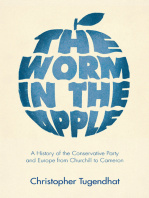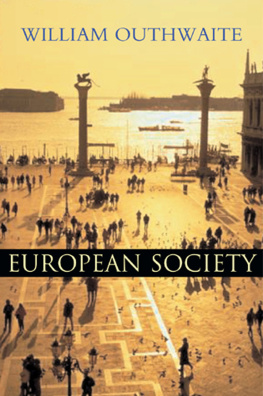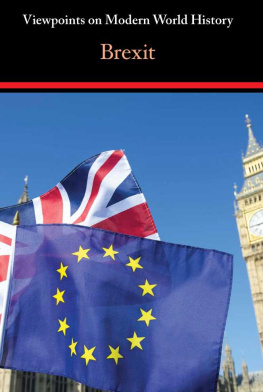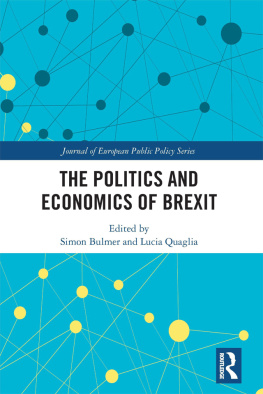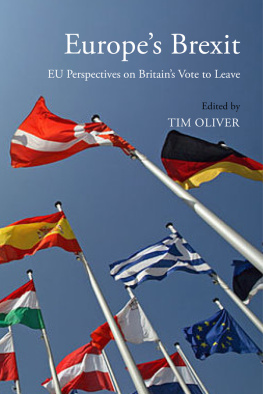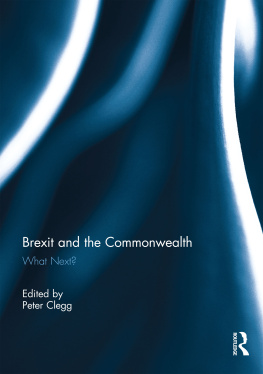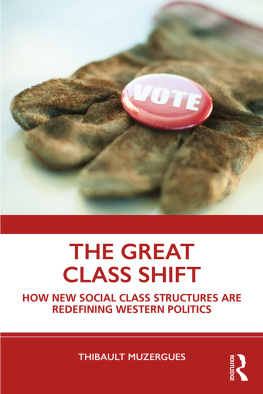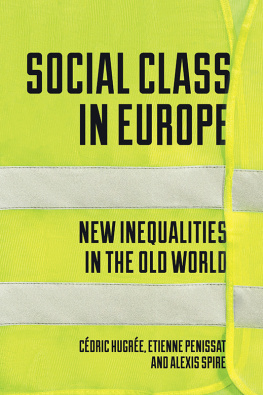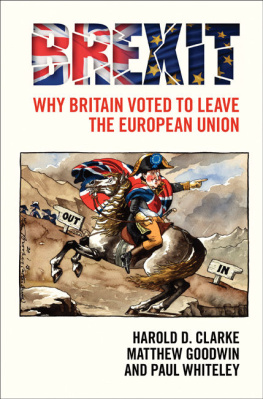Brexit
KEY ISSUES IN MODERN SOCIOLOGY
Key Issues in Modern Sociology series publishes scholarly texts that give an accessible exposition of the major structural changes in modern societies. These volumes address an academic audience through their relevance and scholarly quality and connect sociological thought to public issues. The series covers both substantive and theoretical topics as well as addresses the works of major modern sociologists. The series emphasis is on modern developments in sociology with relevance to contemporary issues such as globalization, warfare, citizenship, human rights, environmental crises, demographic change, religion, postsecularism and civil conflict.
Series Editor
Peter Kivisto Augustana College, USA
Editorial Board
Harry F. Dahms University of Tennessee at Knoxville, USA
Thomas Faist Bielefeld University, Germany
Anne Rawls Bentley University, USA
Giuseppe Sciortino University of Trento, Italy
Sirpa Wrende University of Helsinki, Finland
Richard York University of Oregon, USA
Brexit
Sociological Responses
Edited by William Outhwaite

Anthem Press
An imprint of Wimbledon Publishing Company
www.anthempress.com
This edition first published in UK and USA 2017
by ANTHEM PRESS
7576 Blackfriars Road, London SE1 8HA, UK
or PO Box 9779, London SW19 7ZG, UK
and
244 Madison Ave #116, New York, NY 10016, USA
2017 William Outhwaite editorial matter and selection;
individual chapters individual contributors
The moral right of the authors has been asserted.
All rights reserved. Without limiting the rights under copyright reserved above, no part of this publication may be reproduced, stored or introduced into a retrieval system, or transmitted, in any form or by any means (electronic, mechanical, photocopying, recording or otherwise), without the prior written permission of both the copyright owner and the above publisher of this book.
British Library Cataloguing-in-Publication Data
A catalogue record for this book is available from the British Library.
Library of Congress Cataloging-in-Publication Data
A catalog record for this book has been requested.
ISBN-13: 978-1-78308-644-3 (Hbk)
ISBN-10: 1-78308-644-0 (Hbk)
ISBN-13: 978-1-78308-645-0 (Pbk)
ISBN-10: 1-78308-645-9 (Pbk)
This title is also available as an e-book.
CONTENTS
William Outhwaite
| Martin Westlake |
| Jonathan Hearn |
| John Holmwood |
| Stefan Auer |
| Craig Calhoun |
| Chris Thornhill |
| Gurminder K. Bhambra |
| Colin Crouch |
| Gerard Delanty |
| Tim Oliver |
| Antje Wiener |
| Simon Susen |
| Harry F. Dahms |
| Adrian Favell |
William Outhwaite
Less than six months after the United Kingdom referendum, sociologists and other social scientists are evaluating the implications both for the UK, or whatever remains of it, and, more importantly, for the European Union and for Europe and the world.
Some of these are already evident. The vote has revealed cleavages across the UK on a regional and class basis, paralleled, for example, in the support in France for the Front National. In the UK, we have seen the revival of a kind of class politics, in which working-class voters swing Right rather than Left, reinforcing the middle-class leave vote in much of the richer south of England. The regional divisions are hard to explain: the most deprived areas of the UK, which have benefited substantially from EU development aid, were often those most hostile to membership in the EU.
In the rest of Europe, the vote has opened up as a serious prospect what was previously only a pipe dream of the political fringes: withdrawal from the EU itself. Although one can put this in the context of the Unions failure to attract the support of enough voters in Norway and Switzerland for membership, the shock effect is incomparably greater. The UK was always a semi-detached member state, with opt-outs from Schengen and the euro, but it still carried substantial weight in the formation of EU policy. Even if the vote had gone the other way, however, the UK had already trashed what remained of its reputation as a serious member of the Union. Although one of the immediate responses has been a rise in support for the EU across much of Europe, Brexit has massively strengthened the forces of (mostly right-wing) populist insurgent politics, adding withdrawal to the more local themes of migration and Islamization that play out in different variations across Europe. In the UK, even before the vote, the campaign produced a wave of what, since it was the result of the governments decision to call a referendum, might reasonably be described as state-sponsored hate crime, which has so far cost the lives of a British Member of Parliament and a Polish resident.
This book aims to trace these implications, locating short-term political fluctuations in a broader historical and social context of the transformation of European and global society. It provides a forum for leading Eurosociologists (broadly defined), working inside and outside the UK itself, to rethink their analyses of the European project and its prospects as well as to reflect on the likely implications for what, as Timothy Garton Ash pointed out in a Guardian article, we may come to know as the former UK (FUK).
Ever since Theda Skocpols. The result, similarly, was in one sense clear less than 24 hours after the polls had opened, although its legal validity remains uncertain as we go to press, and in another sense opens up an area of uncertainty that is likely to continue for at least two and probably more like twenty years.
It can be viewed in essentially three ways: as a much-needed warning to the EU to reform itself in one way or another (as Stefan Auer argues here), as a virus that threatens to weaken the Unions viability and perhaps to be the first domino to fall in its dissolution, or as a possible source of reinforcement of attachment to the EU, as Antje Wiener and Tim Oliver suggest, once the UKs or the FUKs fate outside becomes clearer and the dead weight of its long-standing resistance to integration is removed.
This book covers all these dimensions, focusing on the deep-seated social origins in the UK and the rest of Europe of an event that surprised almost everyone some time between 3:00 and 4:00 a.m. on 24 June 2016. As we go to press, its likely consequences range from a declaration that the process was legally flawed and requires a further ratification, which might or might not be forthcoming, to a post-Brexit future that could take a variety of forms and turn out more or less satisfactorily or disastrously for the UK and the rest of Europe.
Unlike the vote, which was evenly split, our view of Brexit is predominantly negative. A cynic might expect this of a cosmopolitan group of social scientists, many of us working in a country where a third of sociological research is currently funded by the EU. We hope, however, that this book will show the value of the sort of sober analysis that was marginalized, to a quite remarkable degree, in the debates before and after the referendum.
Having taken up Chris Rojeks suggestion to edit a book on Brexit, I am immensely grateful to the friends and colleagues who have come together here, after a mere six weeks instead of the more usual minimum of six months, despite other commitments and, in many cases, vicissitudes of health and relocation.


